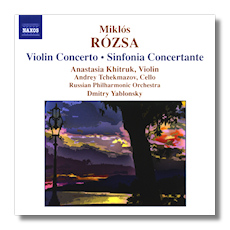
The Internet's Premier Classical Music Source
Related Links
- Rózsa Reviews
- Latest Reviews
- More Reviews
-
By Composer
-
Collections
DVD & Blu-ray
Books
Concert Reviews
Articles/Interviews
Software
Audio
Search Amazon
Recommended Links
Site News
 CD Review
CD Review
Miklós Rózsa

- Violin Concerto, Op. 24
- Sinfonia Concertante for Violin, Cello & Orchestra, Op. 29
Anastasia Khitruk, violin
Andrey Tchekmazov, cello
Russian Philharmonic Orchestra/Dmitry Yablonsky
Naxos 8.570350 2007 65:40
Comparisons (concerto):
Robert McDuffie, Atlanta Symphony Orchestra/Yoel Levi. Telarc CD-80518. 2000.
Jascha Heifetz, Dallas Symphony Orchestra/Walter Hendl. RCA LM 2027. 1956
When Heifetz and Hendl premièred Rózsa's Violin Concerto in Dallas on January 15, 1956, the audience cheered and the music critic of the Dallas Morning News, John Rosenfield, raved that it compared with the violin concertos of Prokofieff, Bartók and Sibelius, and that a "modern composer who can see a lyrical theme through" exhibited "wild passions" and "a thorough exploitation of color resources." I am not sure about the wild passions, though the opening allegro is marked "passionato," or these comparisons, but this concerto is certainly lyrical, well orchestrated and pleasurable to hear. The opening is luscious and the lento cantabile is lovely, particularly toward the end. It is also a virtuoso piece, with a cadenza prominently placed soon after the midpoint of the opening movement.
Heifetz, whose performance is significantly faster than either Khitruk's or McDuffie's – by several minutes – emphasized the virtuosity at the expense of the lyricism, I think. At any rate I find both of the more recent performances much more appealing and certainly neither of these soloists is lacking in virtuosic skill. I cannot fault either of them; even their timings are close – identical in the lento movement. Khitruk does take a minute longer than McDuffie in the first movement.
There are easily discernable differences in the sound of the recent recordings. It is quite good in both, and the Naxos recording is smoother and better balanced than Naxos' recent recording of the Bloch Violin Concerto. Personally, I prefer the vividness of the Telarc recording, on which you can hear more clearly the beautiful horn playing in the first movement. And I don't mind hearing McDuffie as if he were at the other end of my living room. I can recommend both recordings.
The Sinfonia Concertante, which is included on the Naxos disc in its entirety, is in three movements with the long middle one, my favorite, being a theme and variations. Like the concerto, it was written with Heifetz in mind, as well as Gregor Piatigorsky, who suggested this to Rózsa. As it happened, the cello was given the longer part and the cello solo which opens the theme and variations was so long that Heifetz burst out, "Do you expect me to stand there like an idiot all that time?" giving Piatigorsky an opening to reply, "Yes, Jascha, we expect you to stand there like an idiot." Rózsa tactfully shortened the solo, but it is still as long as the cadenza of the Violin Concerto, a good couple of minutes. He later revised the work elsewhere also.
I have some reservations about the Sinfonia Concertante. Rózsa strove to separate his Hollywood composing from the style of his concert music, but it seems to me that some of the former influenced parts of this work. It alternates between sweet lyricism and dramatic force. The former does not strike me as excessive but the dramatic parts come close enough to melodrama that I find myself asking what images they ought to go with. The Telarc disc includes the Theme and Variations from the Sinfonia Concertante, as well as a cello concerto written for János Starker.
Copyright © 2008 by R. James Tobin




















